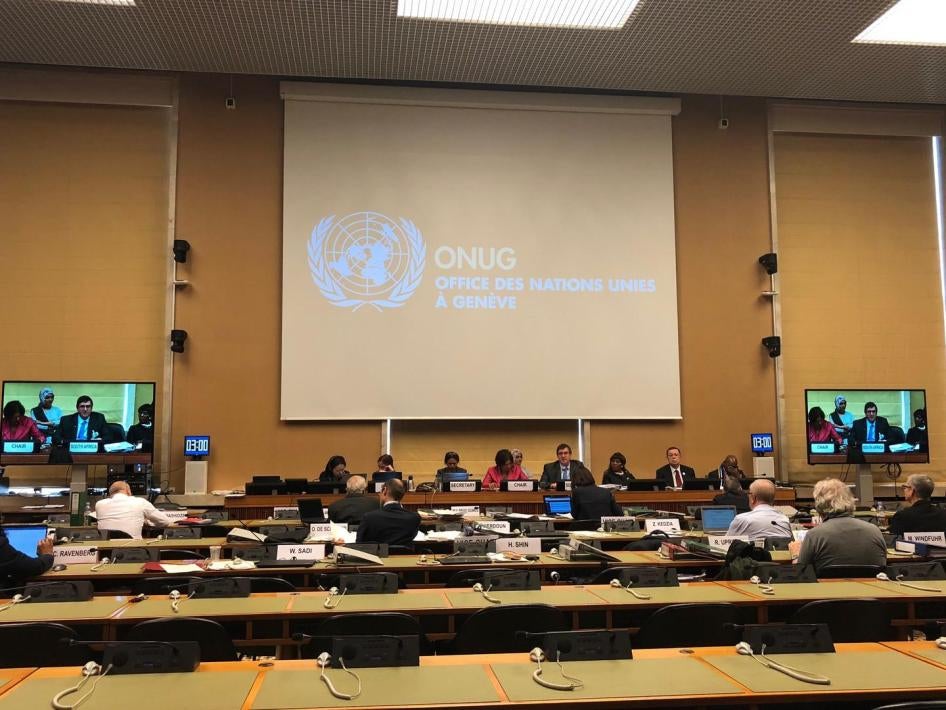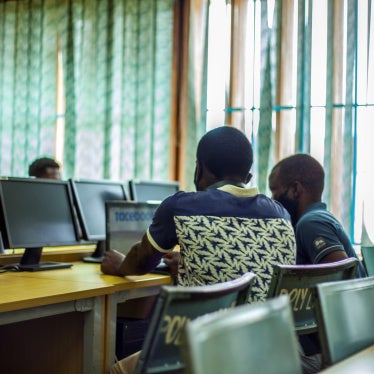(Johannesburg) - South Africa’s Constitution contains a wide range of socio-economic rights. In 2015, expanding and deepening South Africa’s commitment to the realization of socio-economic rights, the South African Government ratified the International Covenant on Economic, Social and Cultural Rights (ICESCR). On international human rights day today we draw attention to recent commitments made by the South African Government, which, if kept, will contribute significantly to the eradication of inequality and elimination of poverty in South Africa. We call on the South African government to keep these commitments.
On 2-3 October 2018, in compliance with its legally binding obligations in terms of ICESCR, a high level government delegation led by Deputy Minister of Justice and Constitutional Development John Jeffery engaged in deliberations with the Committee on Economic, Social and Cultural Rights (UN Committee) in Geneva, Switzerland. The UN Committee is comprised of international experts in the field of socio-economic rights. Its interpretations of ICESCR help determine South Africa’s legally binding obligations in terms of international human rights law. The Constitution requires South Africa to comply with these obligations.
After constructive engagements with a wide range of civil society organisations, the South African Human Rights Commission and the South African Government, the UN Committee issued its “Concluding Observations” to the South African Government on 12 October 2018. The South African Government is required in terms of its ICESCR obligations to report back on its progress on the implementation specified recommendations in these Concluding Observations by October 2020 and provide another full report to CESCR in October 2023.
CESCR’s Concluding Observations span the full range of socio-economic rights in the South African Constitution and ICESCR including equal access to land without discrimination, the right to work, an adequate standard of living, education, health, housing and social security. The Concluding Observations also make broad recommendations on South Africa’s budget process and fiscal framework, tax regime and approach to economic development. In many instances, the UN Committee indicates that the Government is falling short of its obligations to realise socio-economic rights. Many of the Committee’s recommendations may therefore require that action is taken by executive, legislative, judicial and administrative agencies throughout Government.
The UN Committee’s guidance is critical particularly in the context of high and increasing unemployment, rampant poverty and extreme inequality in South Africa. Its recommendations have a direct impact on issues at the centre of public debates about the need to accelerate “economic transformation”, expedite wealth redistribution and eliminate inequality in South Africa. They provide an opportunity for the Government to reevaluate its progress in fulfilling the constitutional promise of socio-economic rights.
As civil society organisations we commend the South African Government for its open engagement with CESCR in compliance with its international human rights law obligations. We note that in its deliberations with the UN Committee, the Government recommitted itself to “meet with civil society representatives after receipt of the Concluding Observations so as to ensure that we further strengthen our commitment to the Covenant”. We welcome this commitment from the South African Government. Today we have written to members of the high level delegation and the South African Human Rights Commission to inquire about the process that will be followed to ensure that the Government’s response to the Concluding Observations is inclusive, participatory, expeditious and effective.
We call on the Government to ensure that discussion and debate about the way forward to ensure compliance with South Africa’s international obligations is as inclusive as possible. We also call on the government to ensure that this commitment is extended thorough meaningful public consultations involving all public policies and laws in South Africa affecting the realization of socio-economic rights.
We call on the South African Human Rights Commission to play a significant role in this process given its mandate to “promote respect for human rights and a culture of human rights”.
We call on members of the public, civil society organisations, trade unions, political parties, businesses and the Government to study CESCR’s Concluding Observations closely and participate in lively discussion and debate to ensure their implementation.
Media requests for comment/interview should be directed through:
Zukiswa Pikoli | mailto:pikoli@section27.org.za |+27 (0)11 356 4100 Gladys Mirugi-Mukundi | mailto:gmirugi-mukundi@uwc.ac.za | +27(0)62 071 4812 Tim Fish Hodgson | mailto:timothy.hodgson@icj.org | +27(0)82 871 9905
This statement is issued on behalf of the following organisations:
Amnesty International
Association for Progressive Communications Black Sash Children’s Institute, University of Cape Town Dullah Omar Institute
Equal Education
Equal Education Law Centre
Human Rights Watch
Institute for Poverty, Land and Agrarian Studies Institute for Economic Justice International Commission of Jurists Legal Resources Centre Media Monitoring Africa People’s Health Movement South Africa Right to Know Campaign
SECTION27
Studies in Poverty and Inequality Institute









